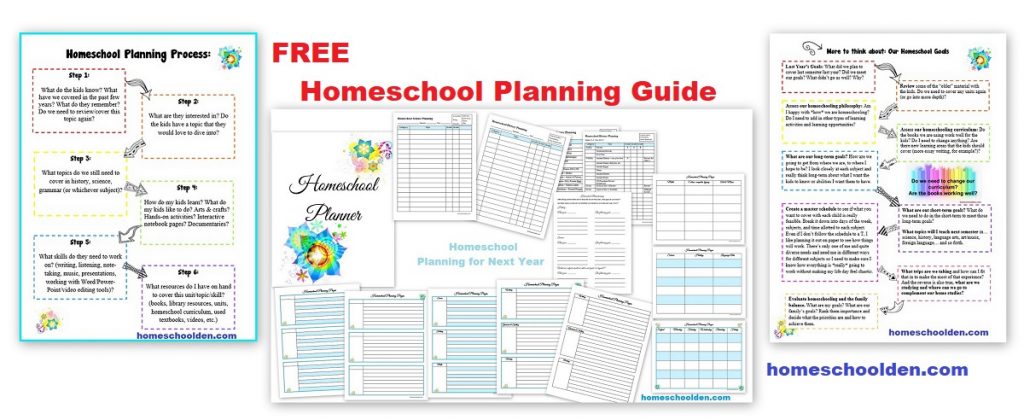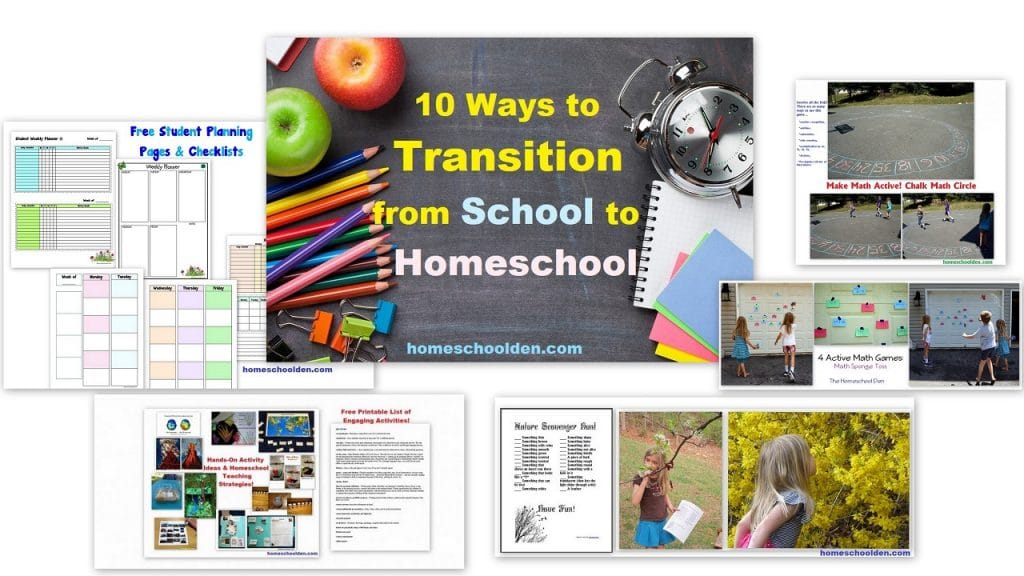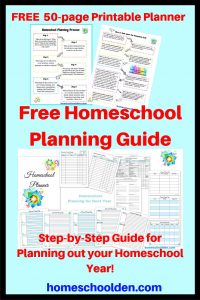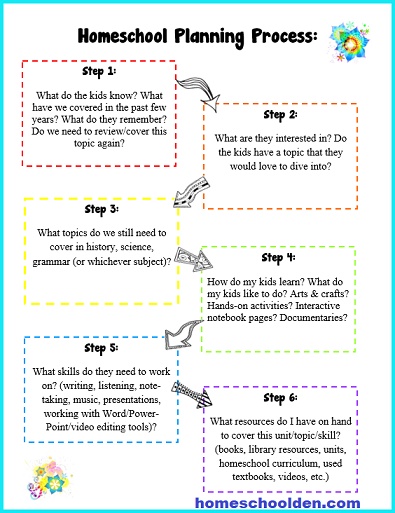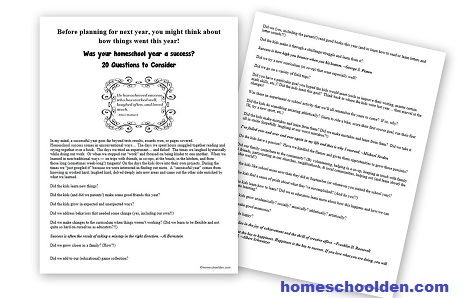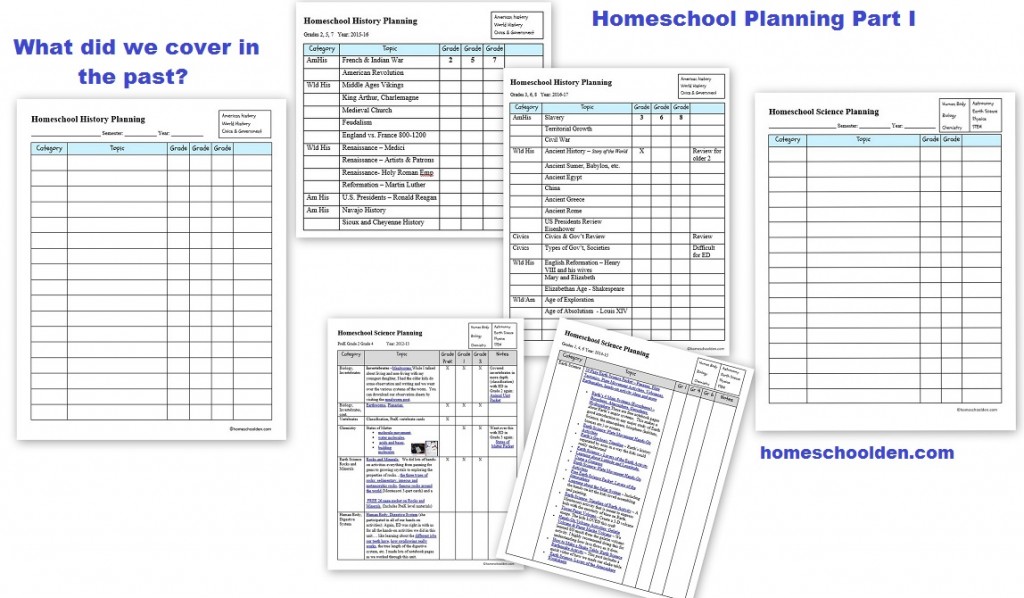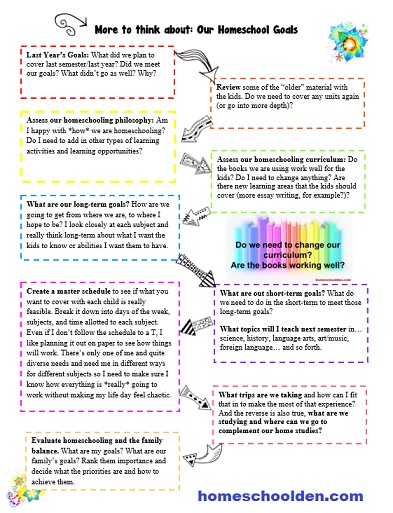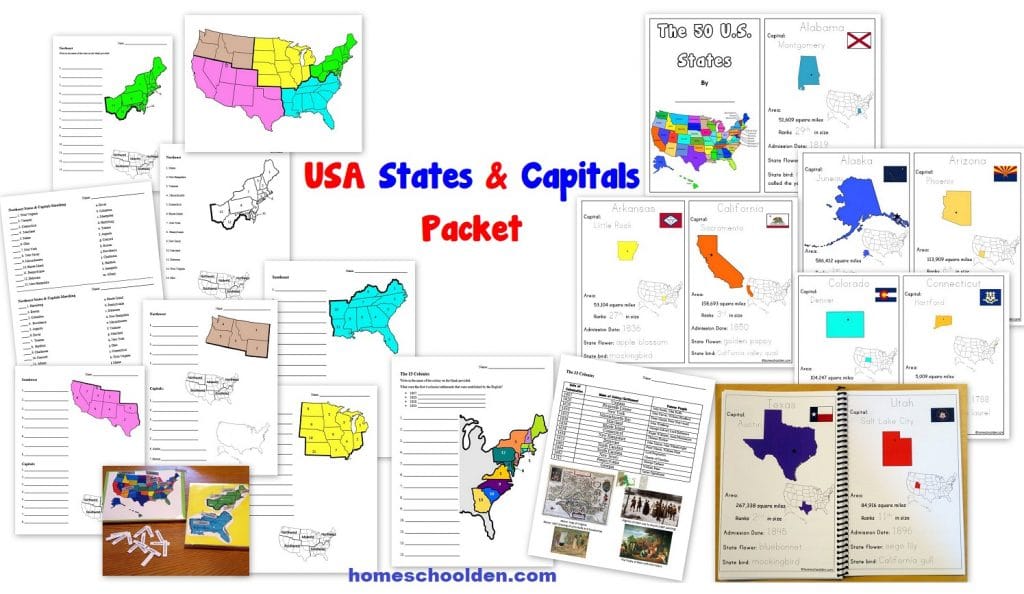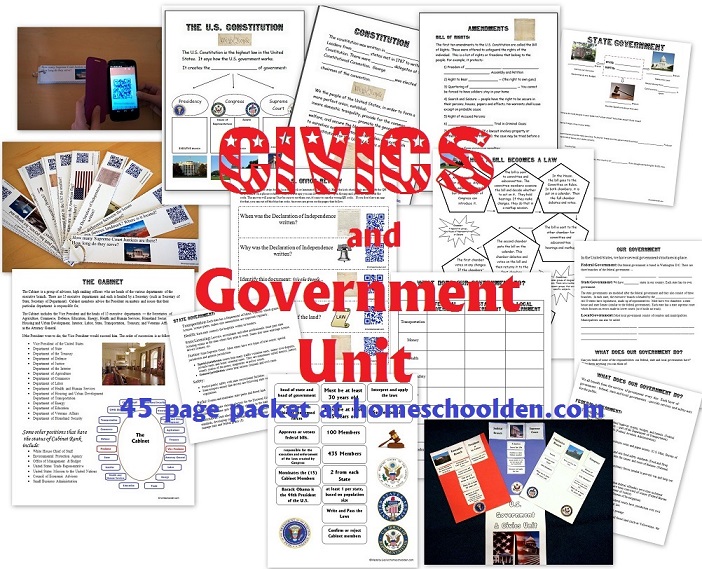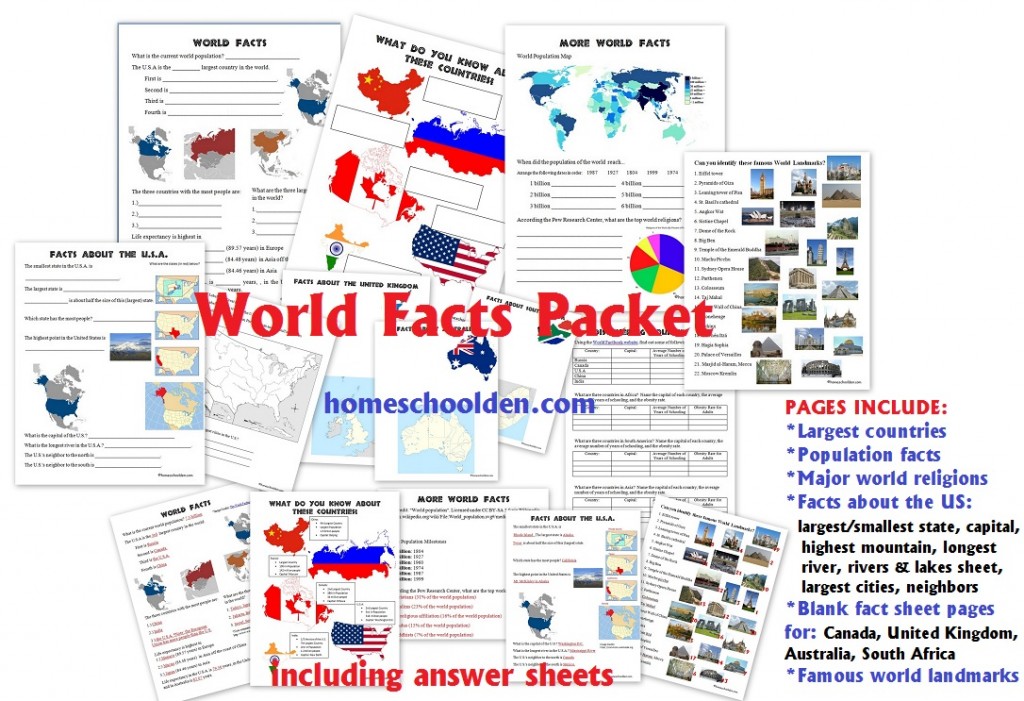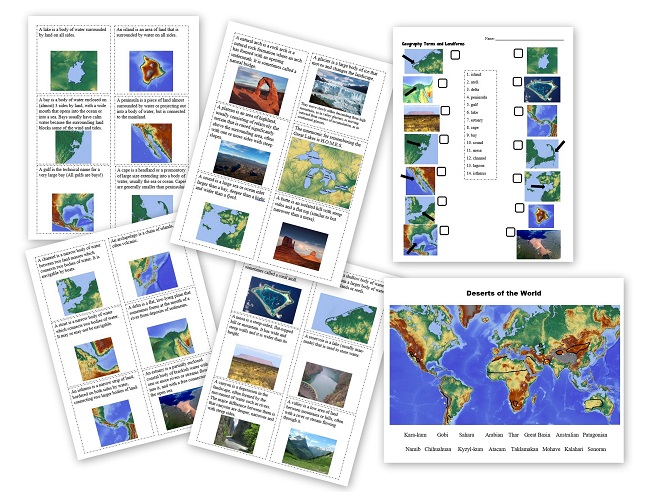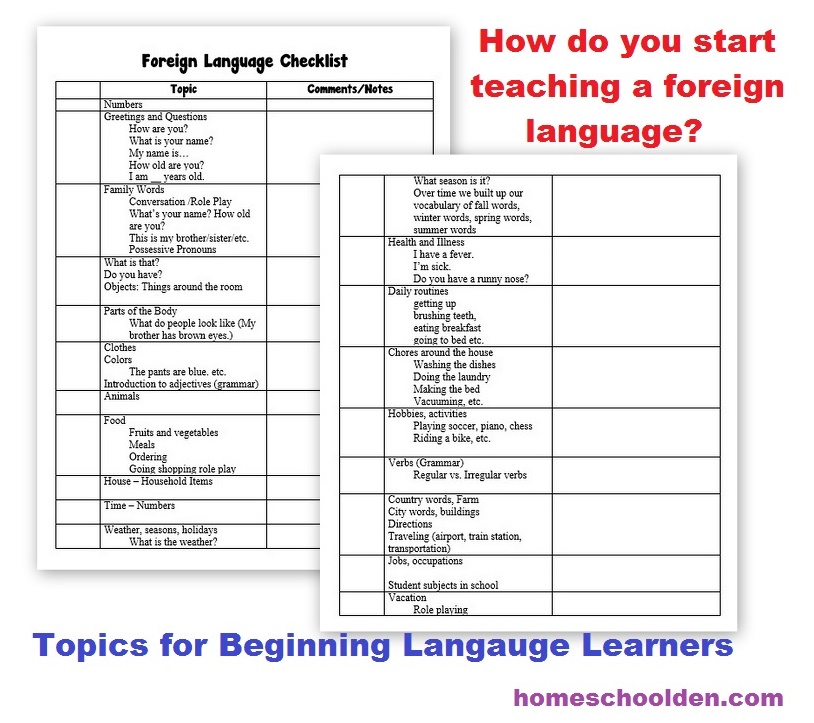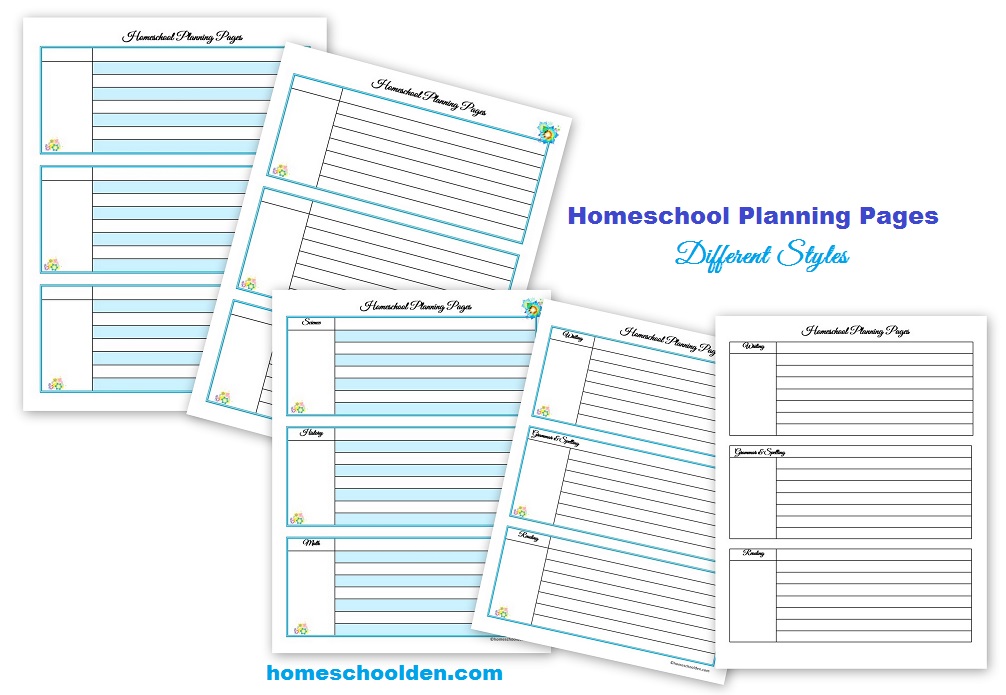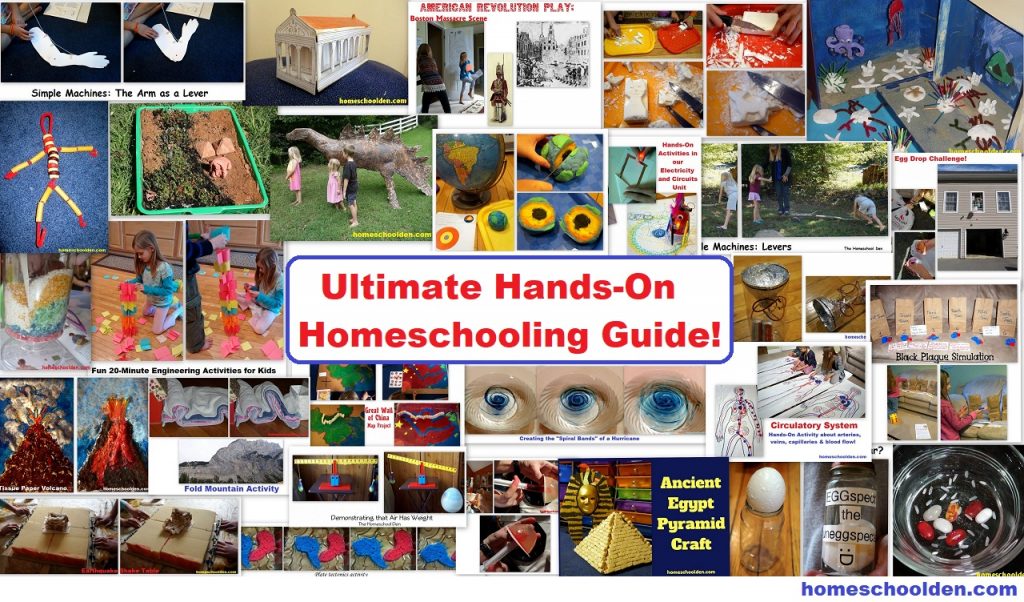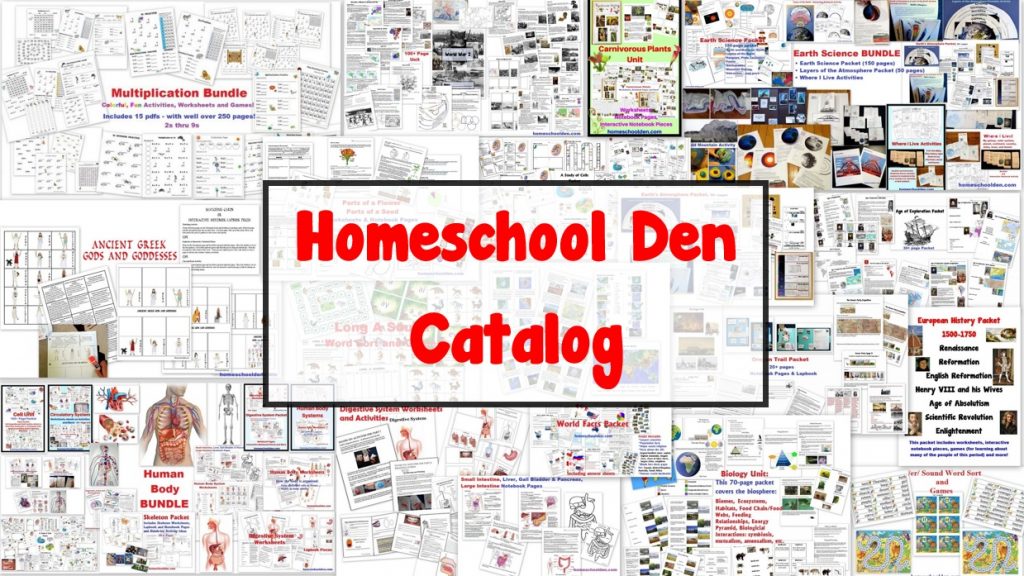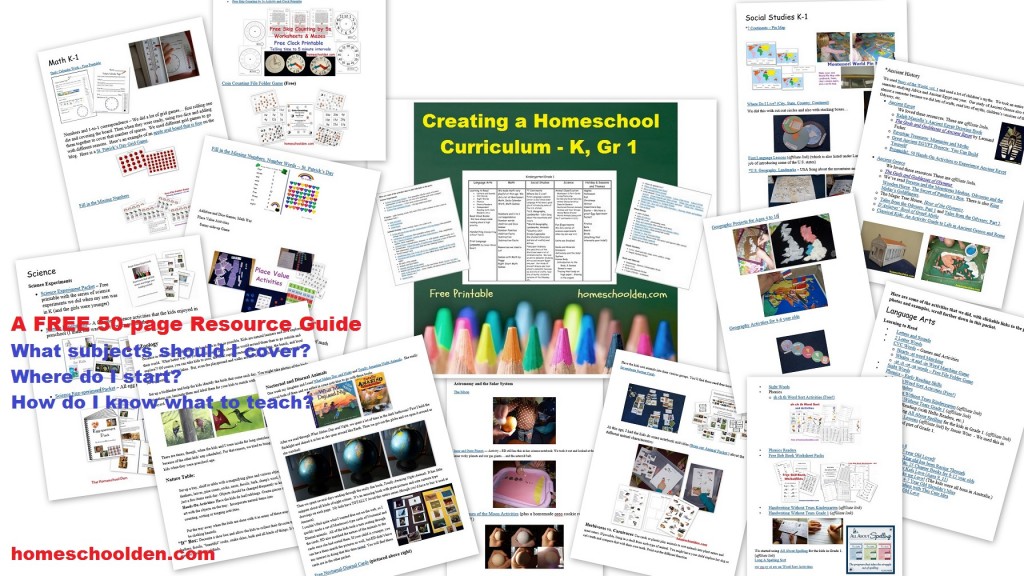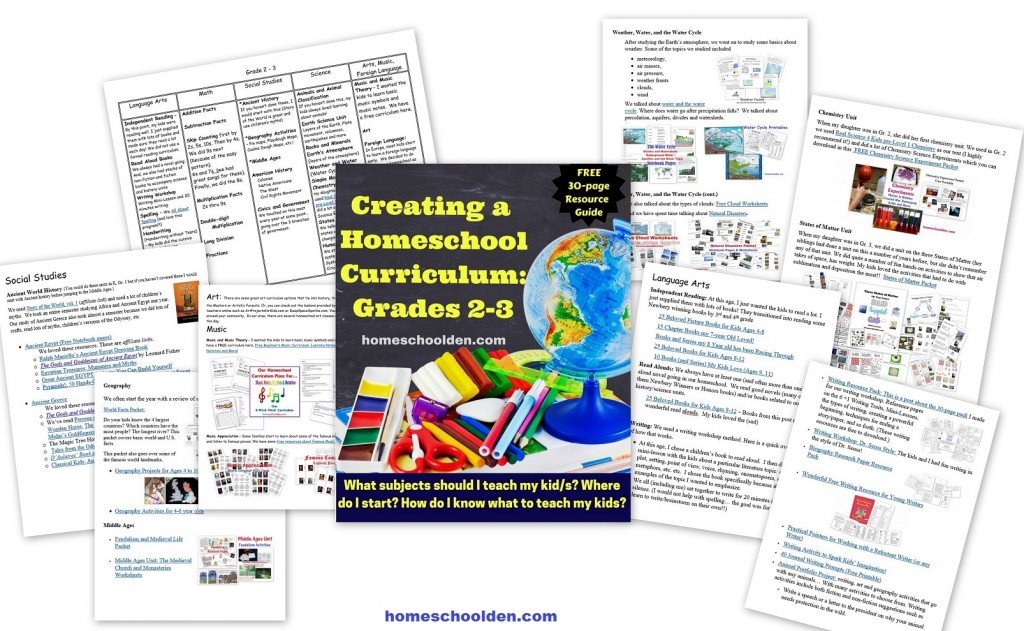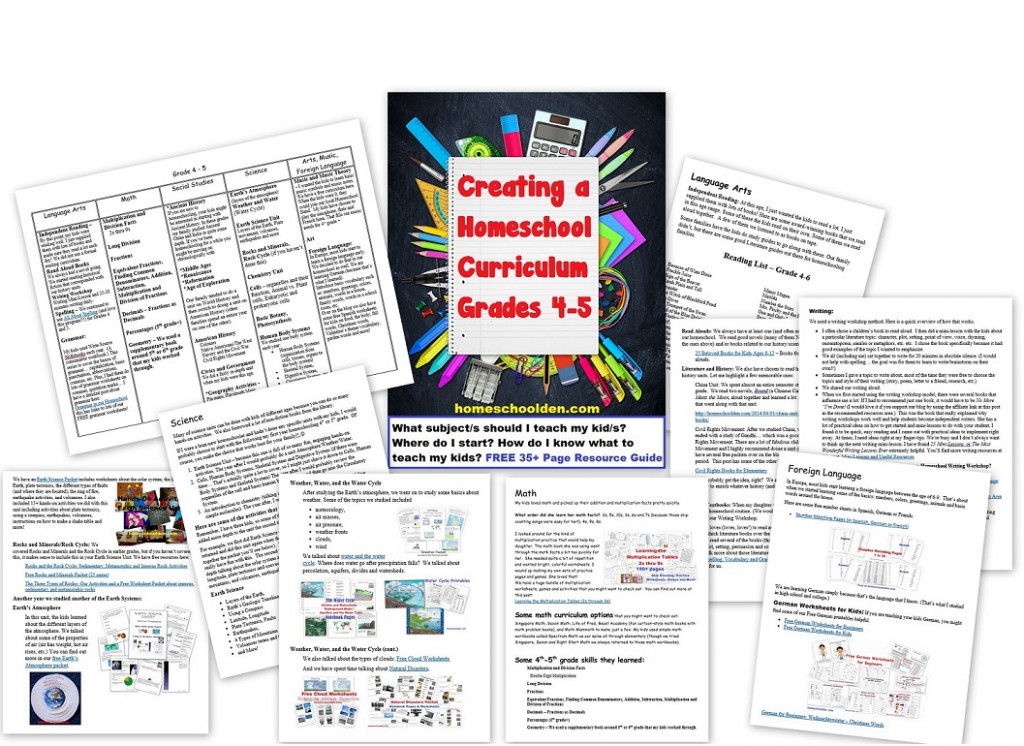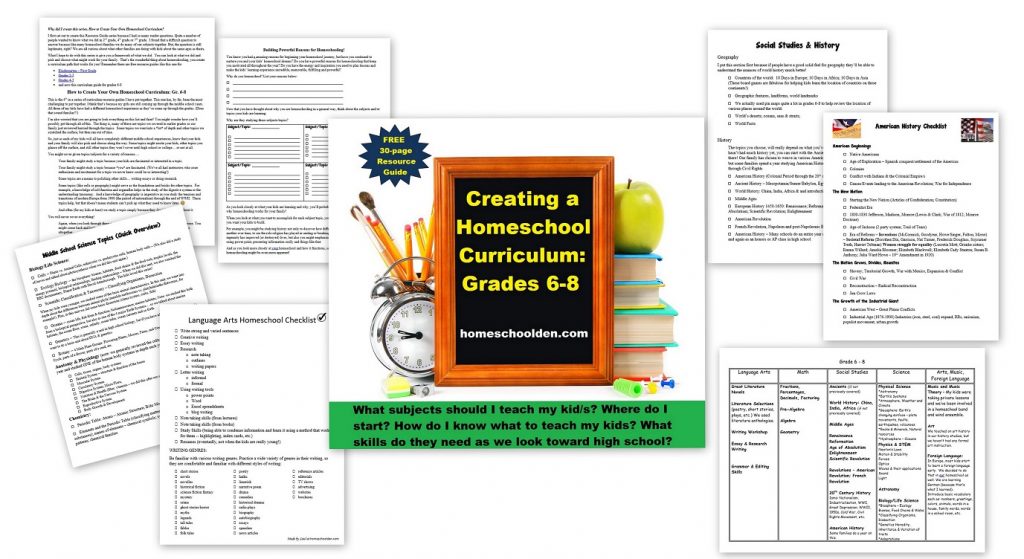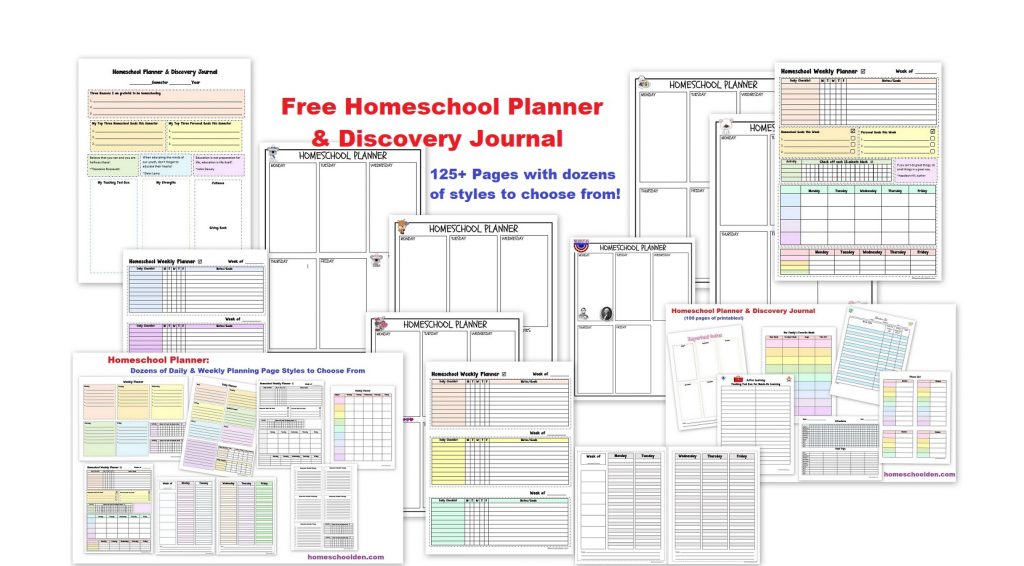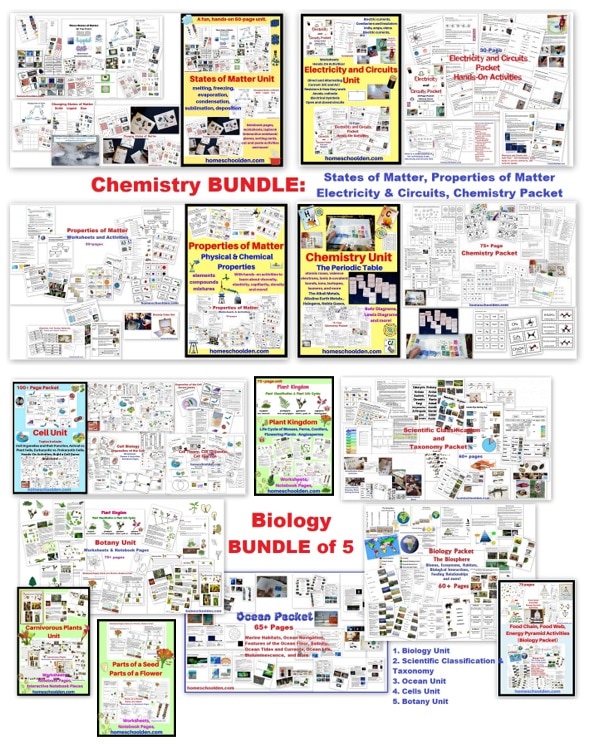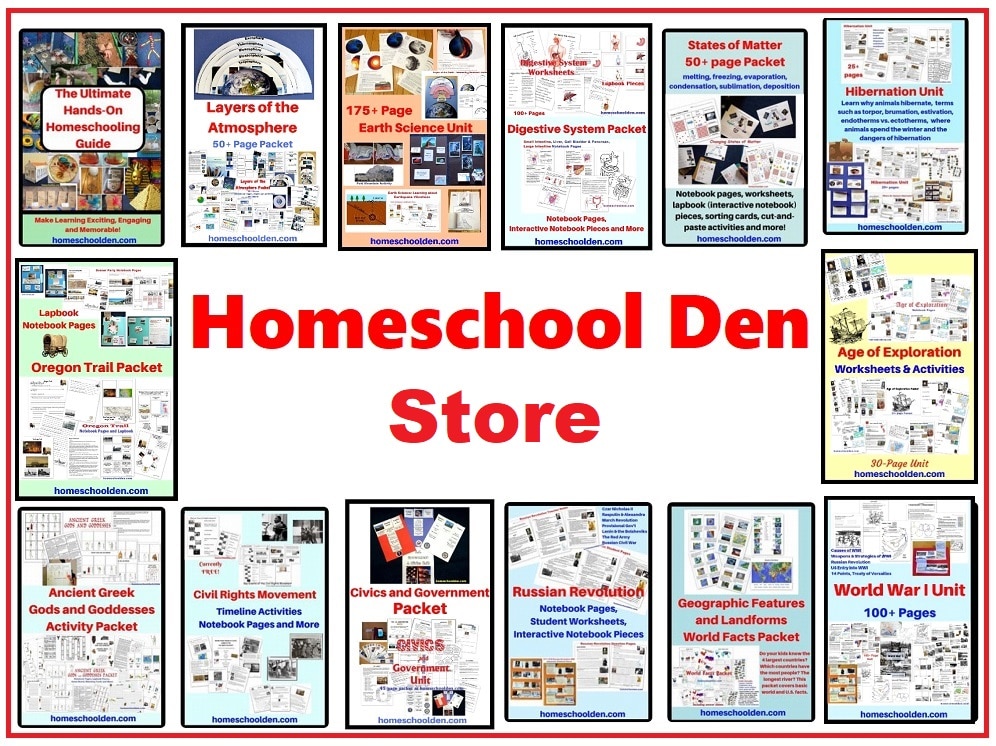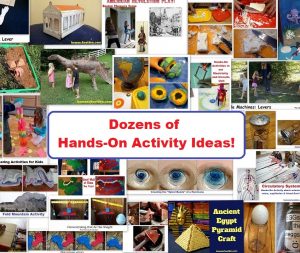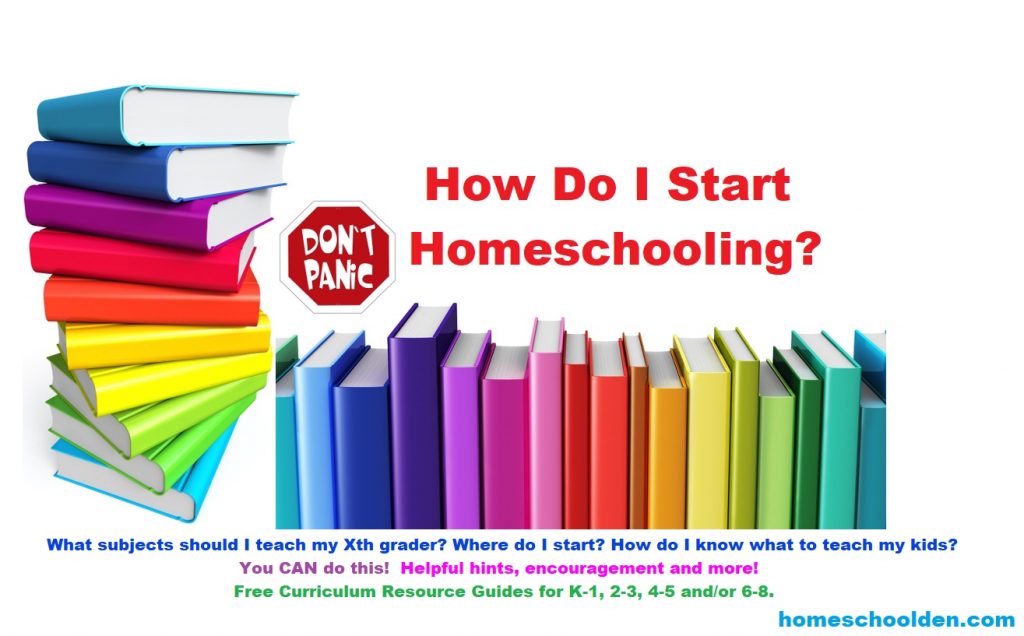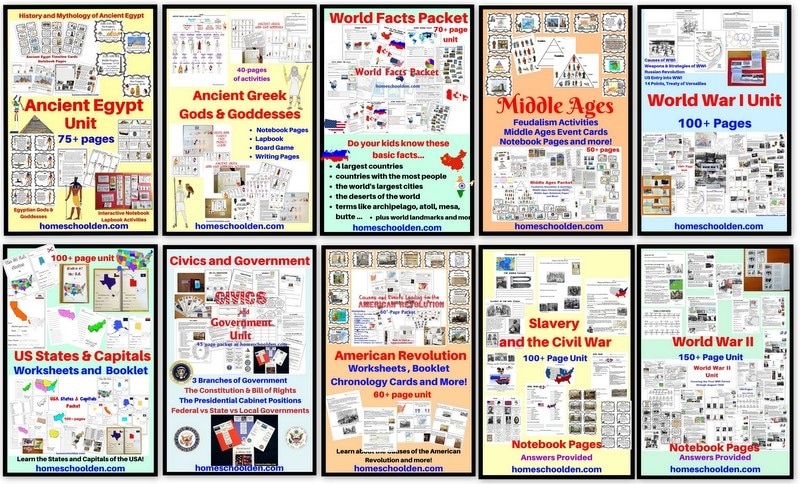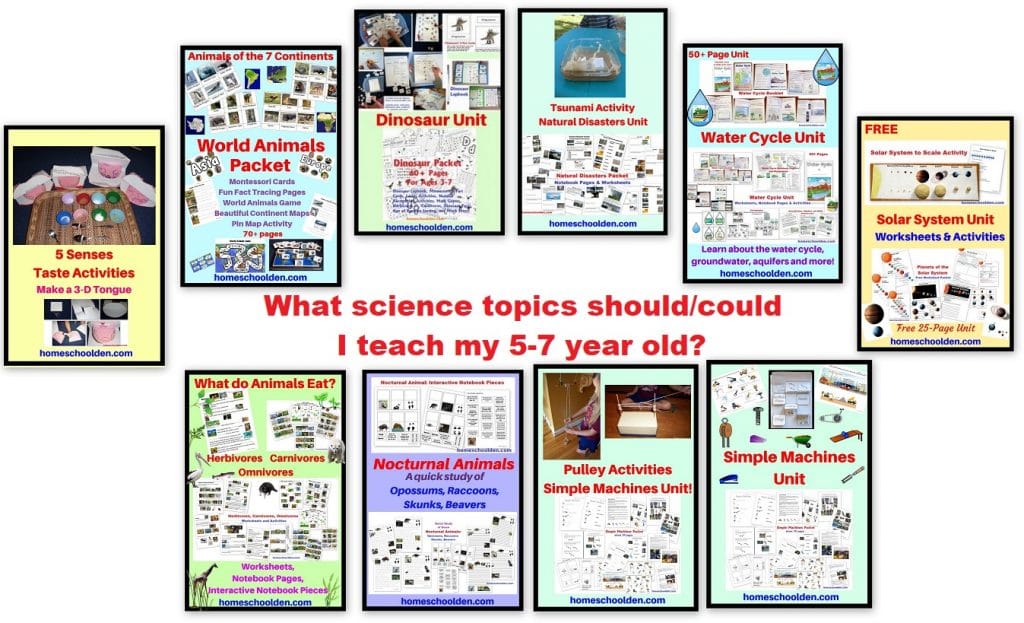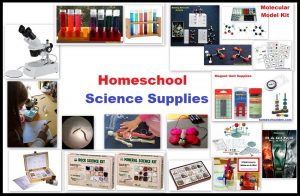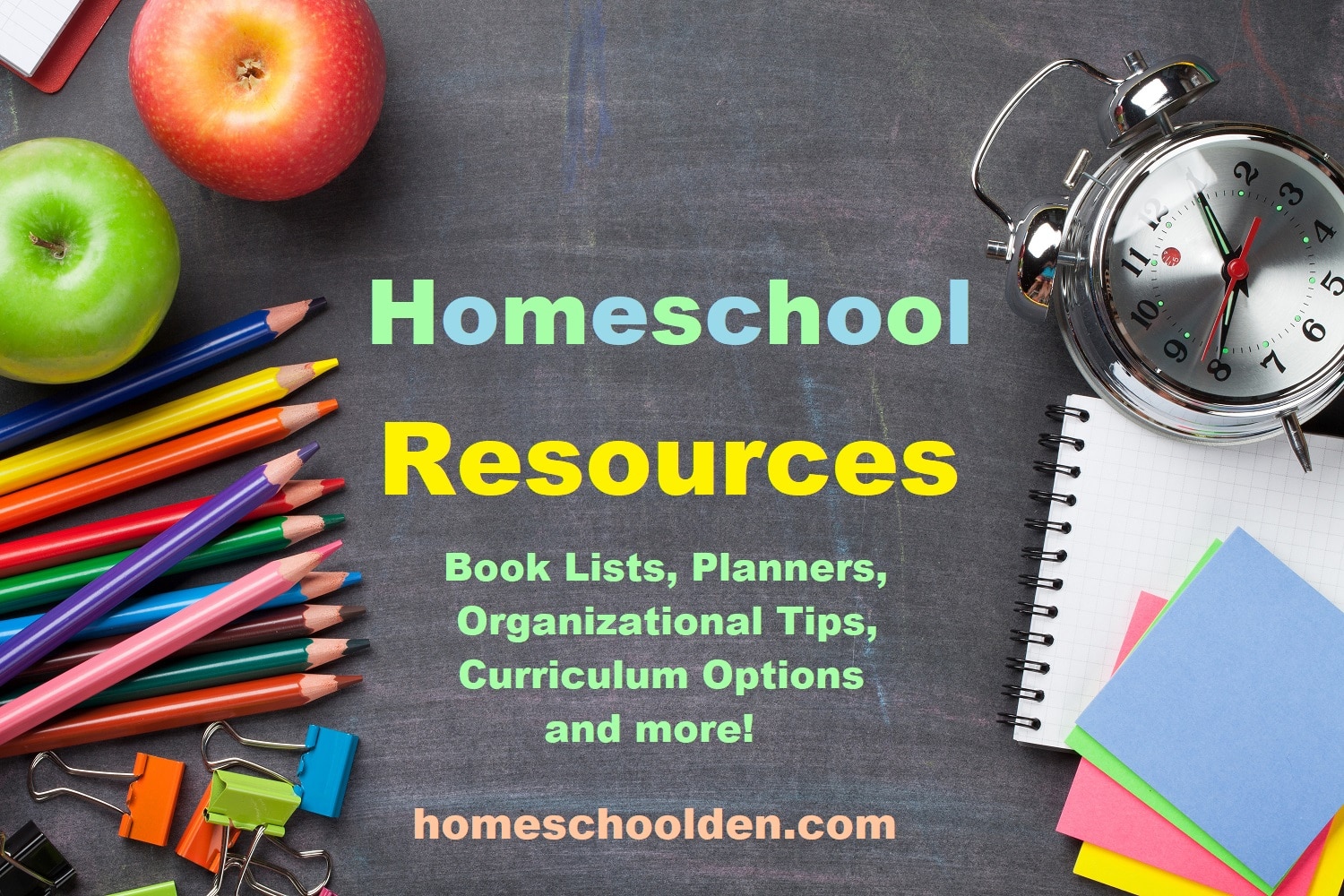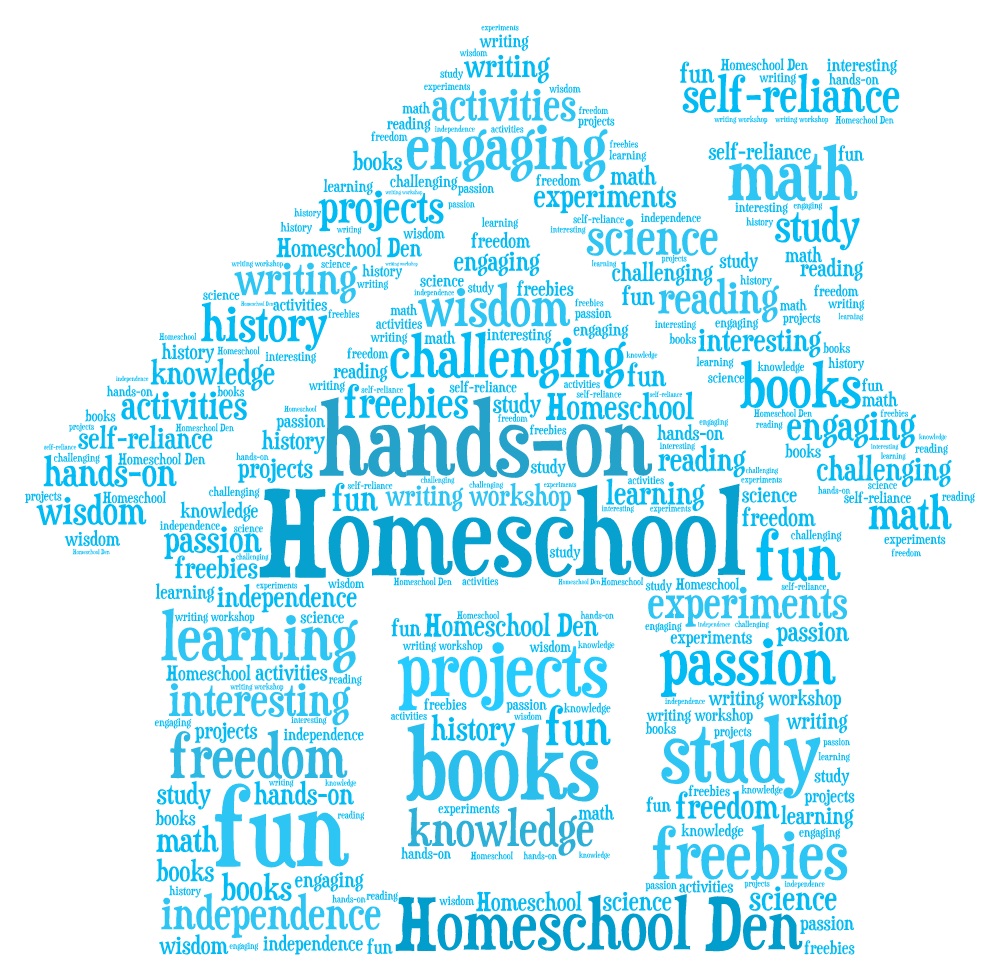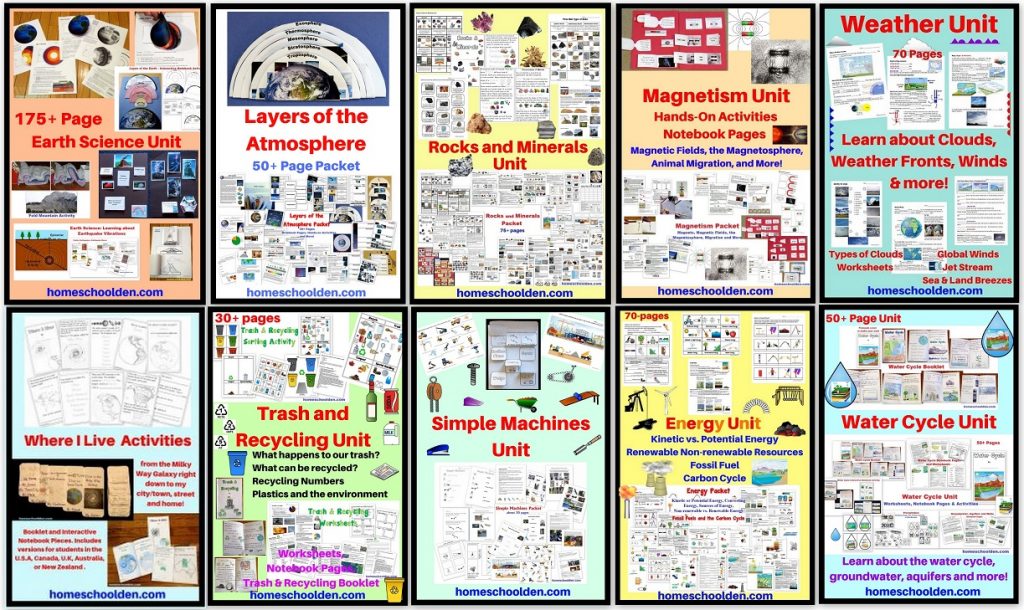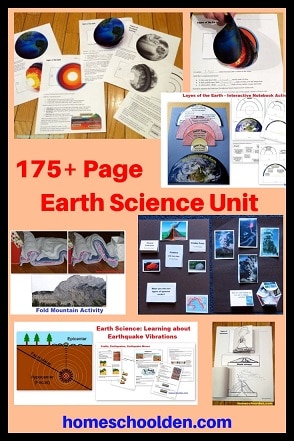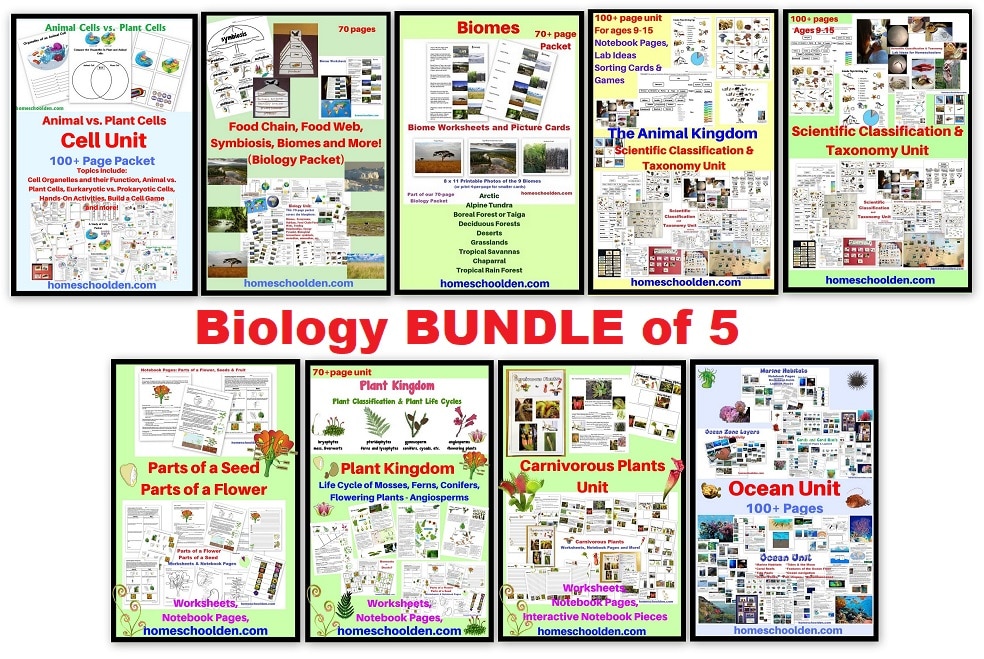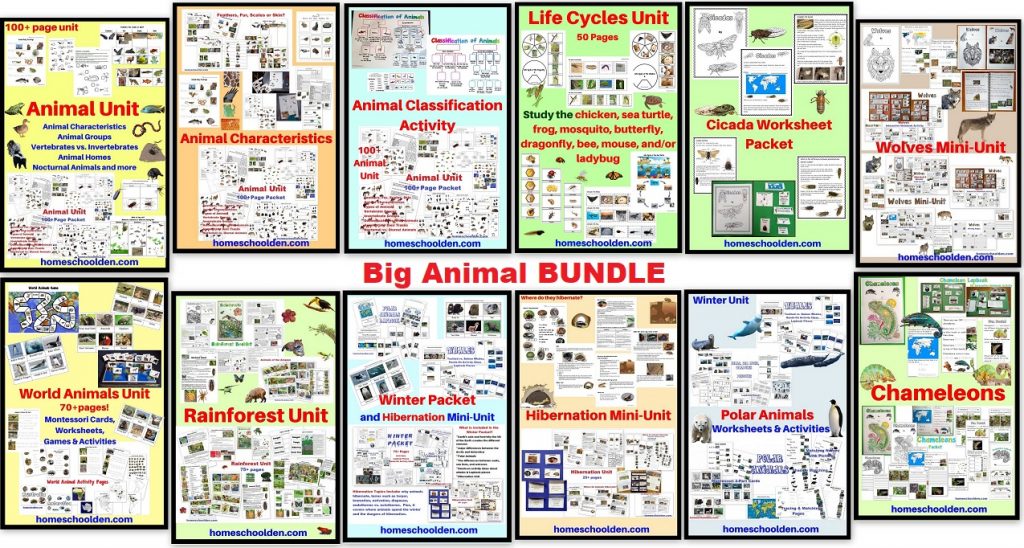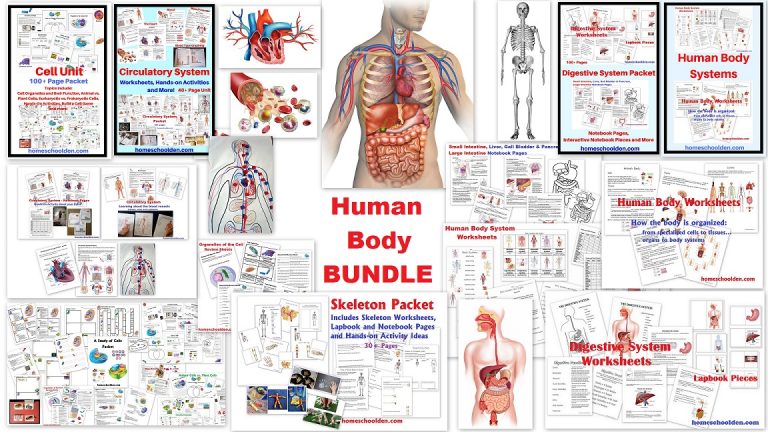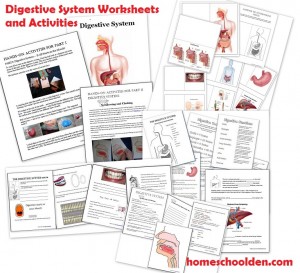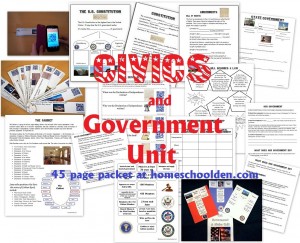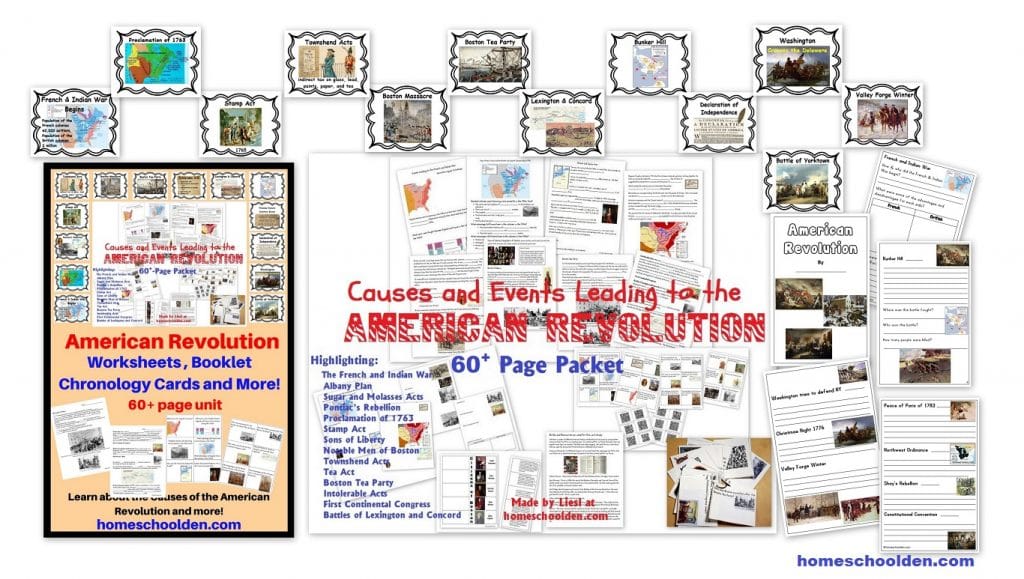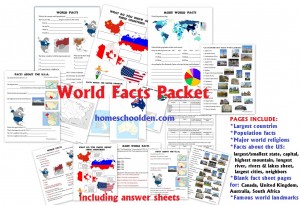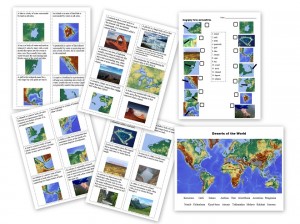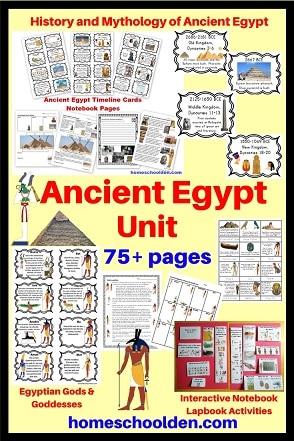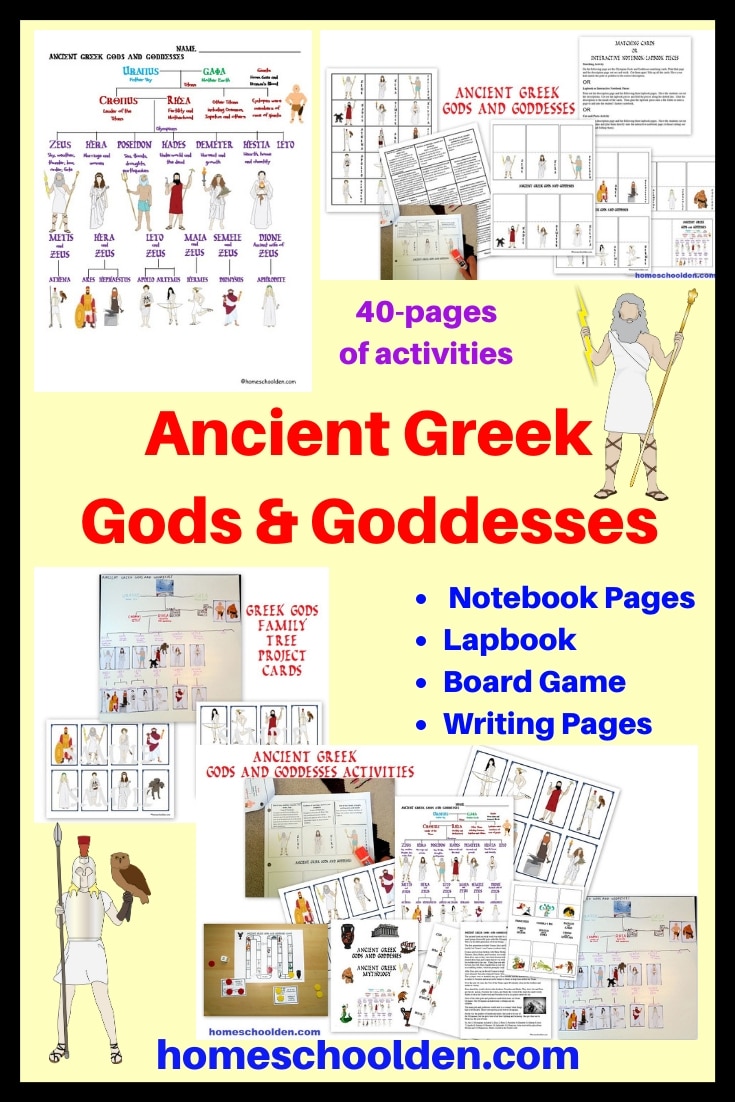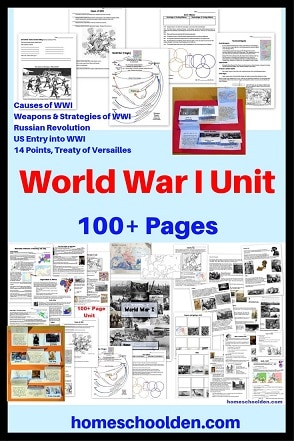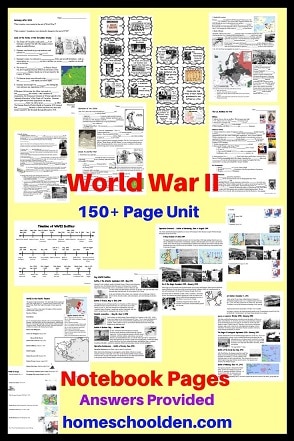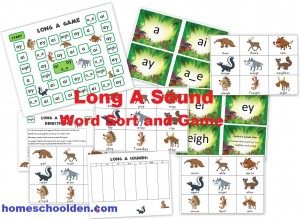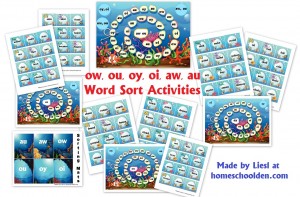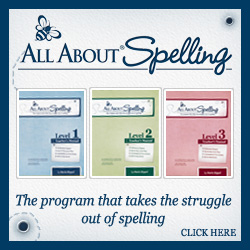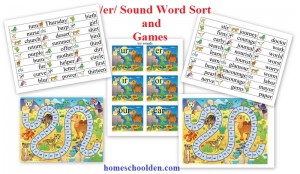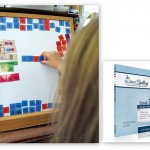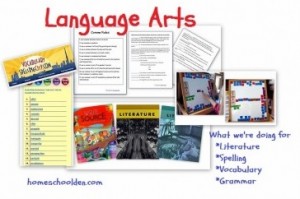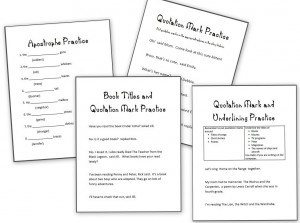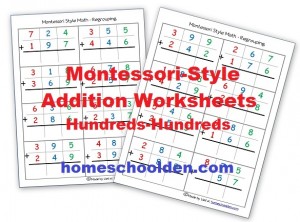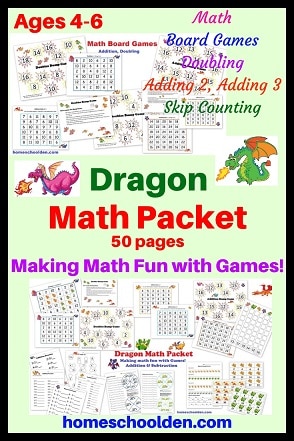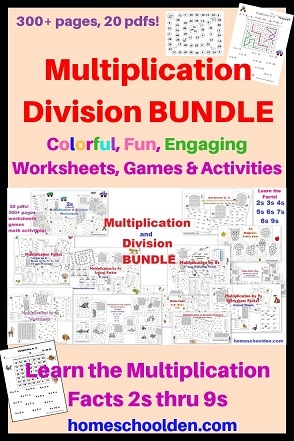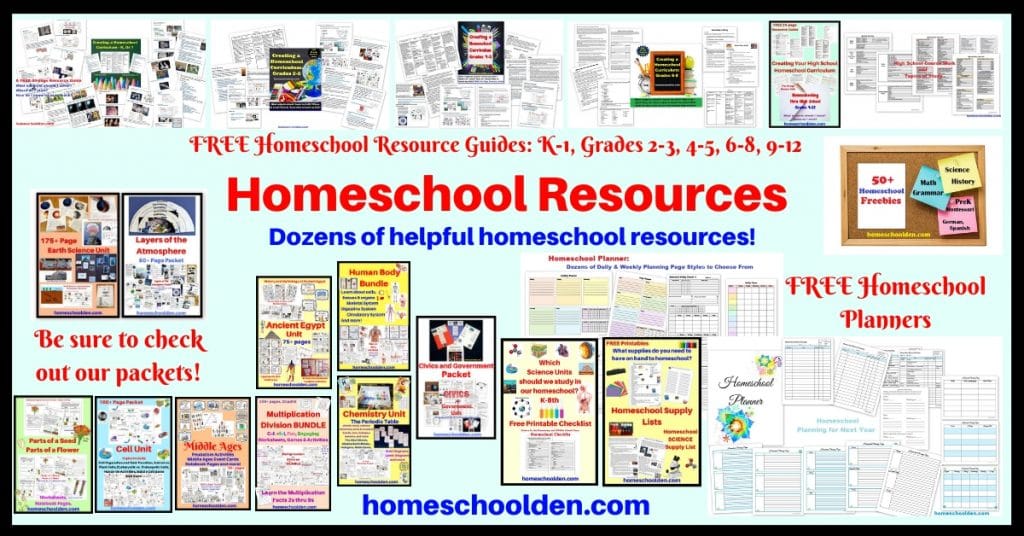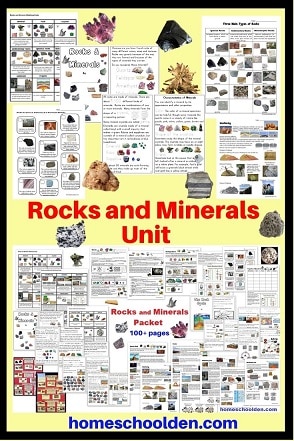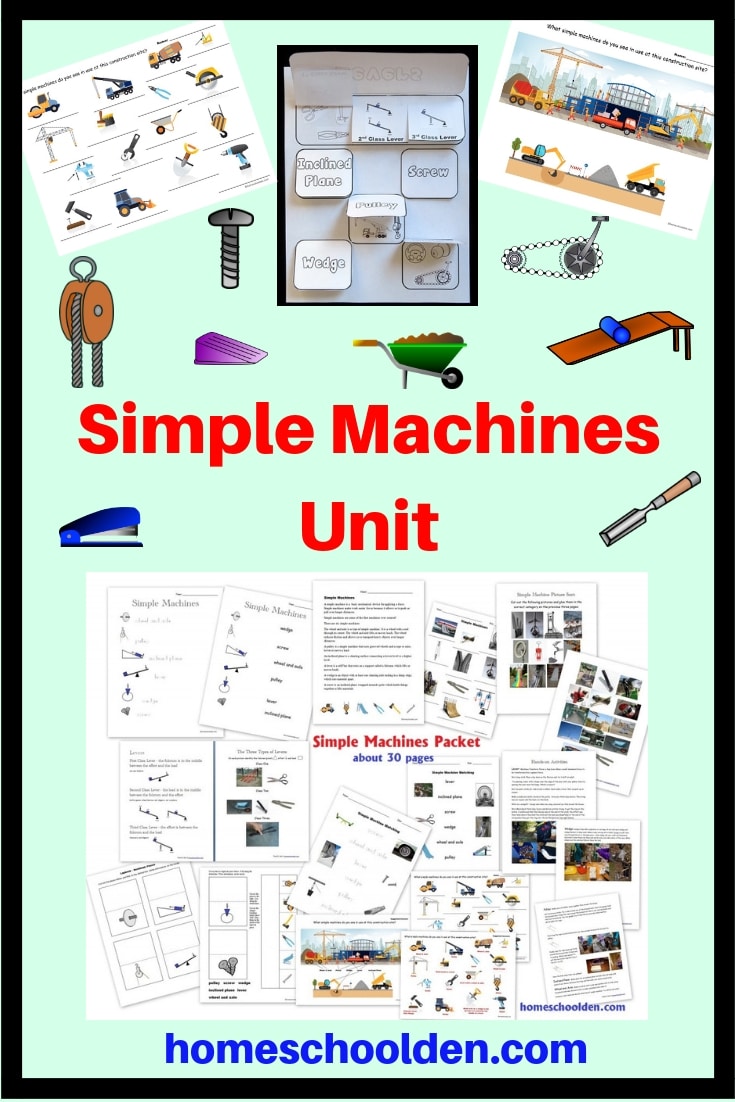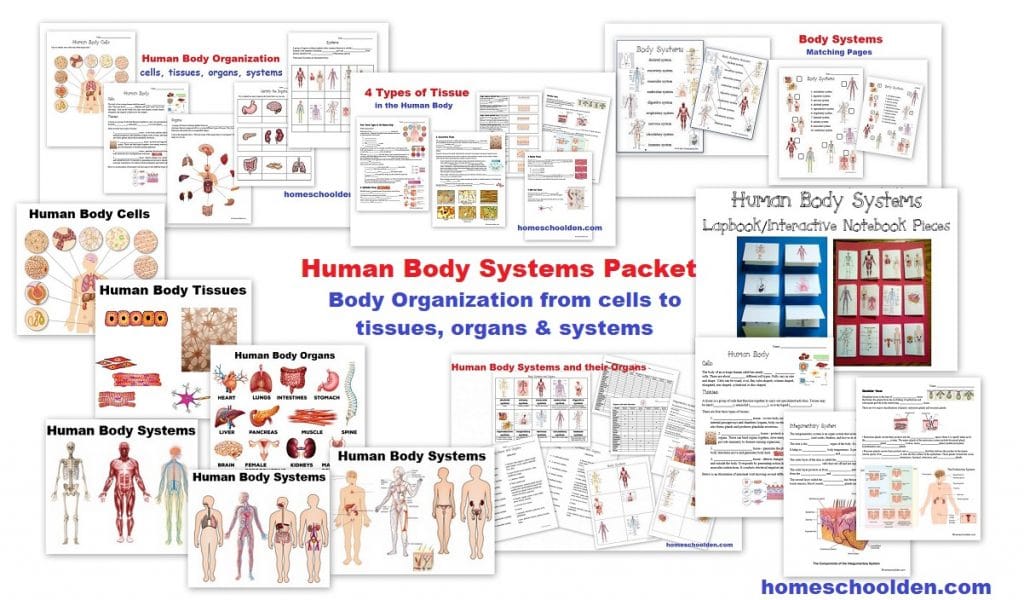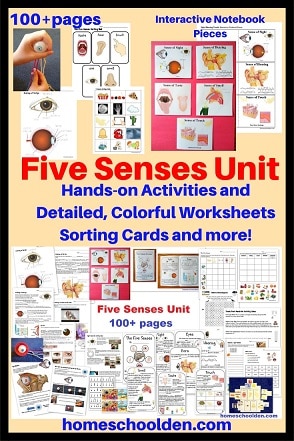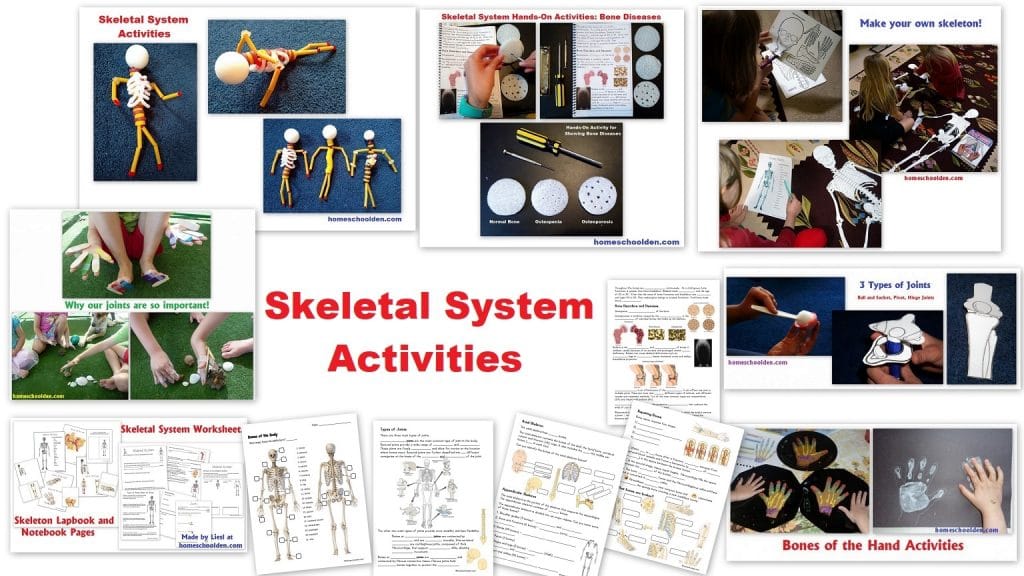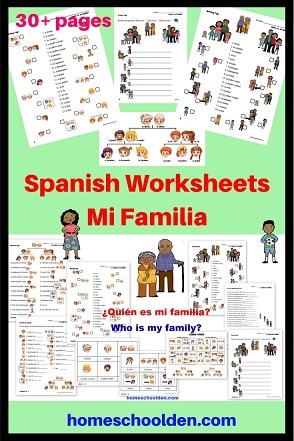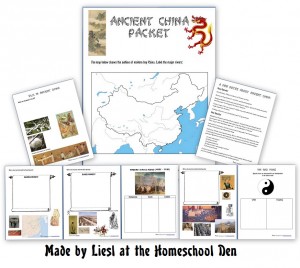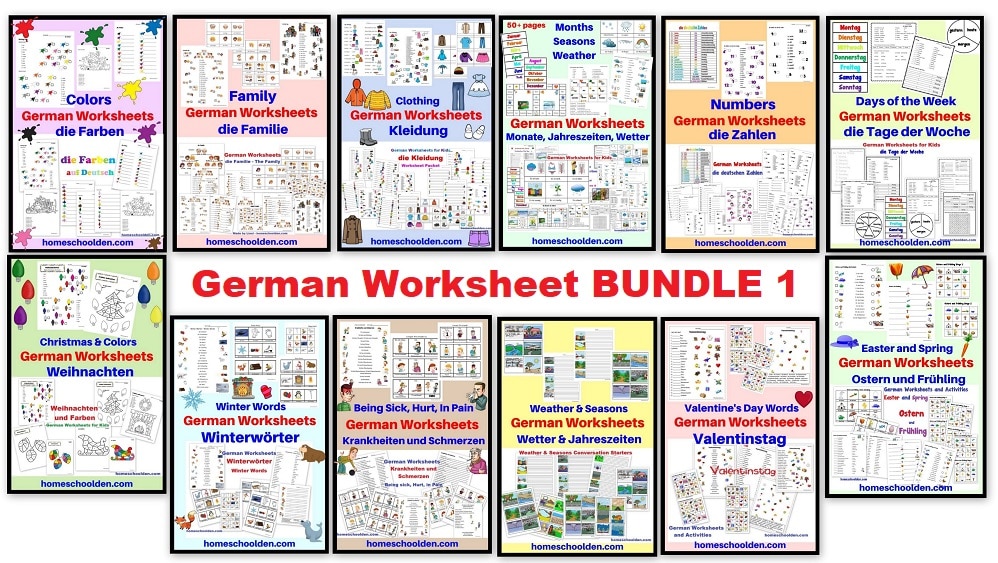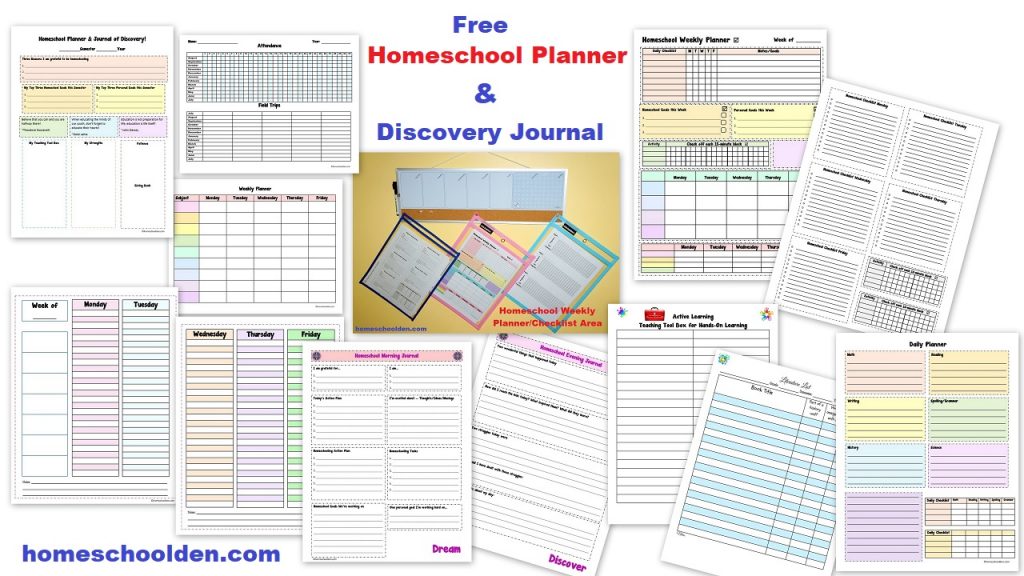Free Homeschool Planning Guide
Free Homeschool Planner! (Newly Updated!)
I have updated our (free) yearly homeschool planner to include a step-by-step guide on the homeschool planning process. This 50+ page packet is not as much a traditional Homeschool Planner as a tool for planning out the coming year. It includes some of the questions to ask yourself (and your kids!) as you start planning out the coming year. It has you consider how the school year has gone, what can go better, if your homeschool style is working or if it needs to be tweaked, what subjects your kids need to cover.. and more!
This is a free 50+ page Homeschool Planning Resource Guide:
Other Free Homeschool Resources:
You might find some of our other free resources helpful as you plan out your homeschool year! 🙂
- Free 100+page Homeschool Planner (for your daily/weekly homeschool schedule)
- Free Science Unit Checklist (These are the science units we plan to cover from Kindergarten to Grade 8 … Ages 5-14 or so). This list has been HUGELY popular over the years… it includes all the science topics/units we hoped to study in elementary and middle school.
- Free Curriculum Resource Guides: These are FREE 35+ page resource guides that I put together to help answer some basic questions: What subjects should I teach my 2nd or 5th or 8th grader? Where do I start? How do I know what to teach my kids? These are some of the units and topics our family covered in these years. It might provide a starting point for those of you just starting your homeschool journey and may give you an idea or two if you’ve been at this homeschool thing for a while!
- Creating a Homeschool Curriculum: Kindergarten – Grade 1 (Ages 5-7)
- Creating Your Homeschool Curriculum: Grades 2-3, Resource Guide (Ages 7-9)
- Creating Your Homeschool Curriculum Grade 4-5 — Free Resource Guide (Ages 9-11)
- Creating a Homeschool Curriculum for Grades 6-8 – Free Resource Guide (Ages 11-14)
- Are you transitioning from public school to homeschooling? You might enjoy this post which was written in March for those parents who found themselves suddenly homeschooling: 10 Ways to Transition from School to Homeschool
- Homeschool Teaching Strategies and Hands-On Activity Ideas Also, you can grab this free printable with all different kinds of homeschool teaching strategies.
Homeschool Units
Before I go on to talk about the planning process, I want to mention a couple of pages that might help as you plan out science and social studies units (ie. history, geography, etc.).
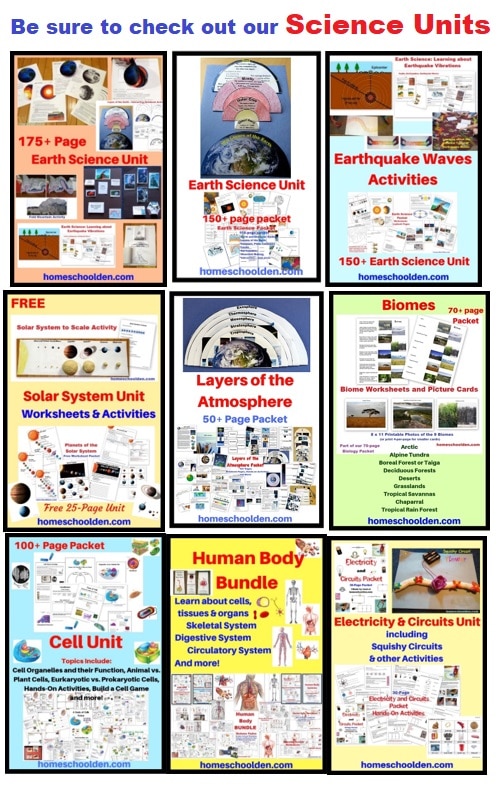
History Units — My background is in history (I taught high school and 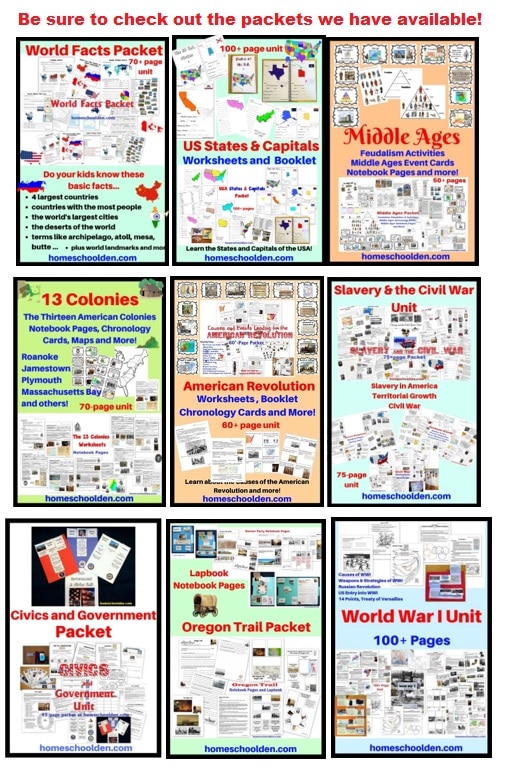
See our Store for more details!
Writing Workshop: Recently, I shared a new video about how/why we started using a Writing Workshop model in our homeschool. It totally transformed writing time from a time of struggle into one of the favorite parts of our day! Plus, you can check out our 300+ pages of Writing Resources at this Writing Workshop post.
Homeschool Planning: Looking at the Big Picture
One of the amazing things about being homeschoolers is that we get to look out at our kids’ homeschool journey in its entirety. We know that we have many years to learn about our world. We have years to cover a wide variety of subjects & topics, and to build the skills they need as adults.
Using an airplane metaphor, every now and then, we can pull back and see the fields and cities… the bridges that connect things together.

We know that eventually our kids will make it to the horizon and over the mountains to the other side… adulthood… no matter which roads we take or what kinds of vehicles we use!
The roads we take… are like the subjects and topics we cover. Some might seem more major than others, but ultimately the kids cross those mountains and will be fine! If we don’t cover something, well, they will have the skills to pick up that knowledge later!
The vehicle we take… those are like our homeschool styles and tools (curriculum) we use. Whether you are eclectic or an unschooler, use more classical methods or online curriculum, the kids are moving ahead and learning. We might use units, textbooks, living books, library books, homeschool curriculum. We might attend co-ops or wing things on our own. We might travel extensively or explore the world through David Attenborough’s spectacular documentaries.
In the end, no matter what method & style we use, no matter what subjects & topics we cover, our kids will reach the end of their homeschool journey and will be just fine. They’ll be better than fine, they will be amazing!
How do I know? Well, you’ve made the commitment to homeschool your kids and take this journey with them! Who is better suited to accompany them than you?!!
The Homeschool Planning Process
This year I added quite a number of new pages to the Homeschool Planner. Remember this is not a daily planner (we have a free 100+ Homeschool Planner & Discovery Journal here). This planner is about the Planning Process… looking at the big picture… your homeschool goals, your homeschool style, what you’ve covered already… and what you still want to cover in the coming year and in the years ahead…
Click here to save the Free Homeschool Planning Guide on Pinterest:
Click here to download the newly updated FREE Homeschool Planning Guide
$0.00
Be sure to check out Our Store to check out our other packets!
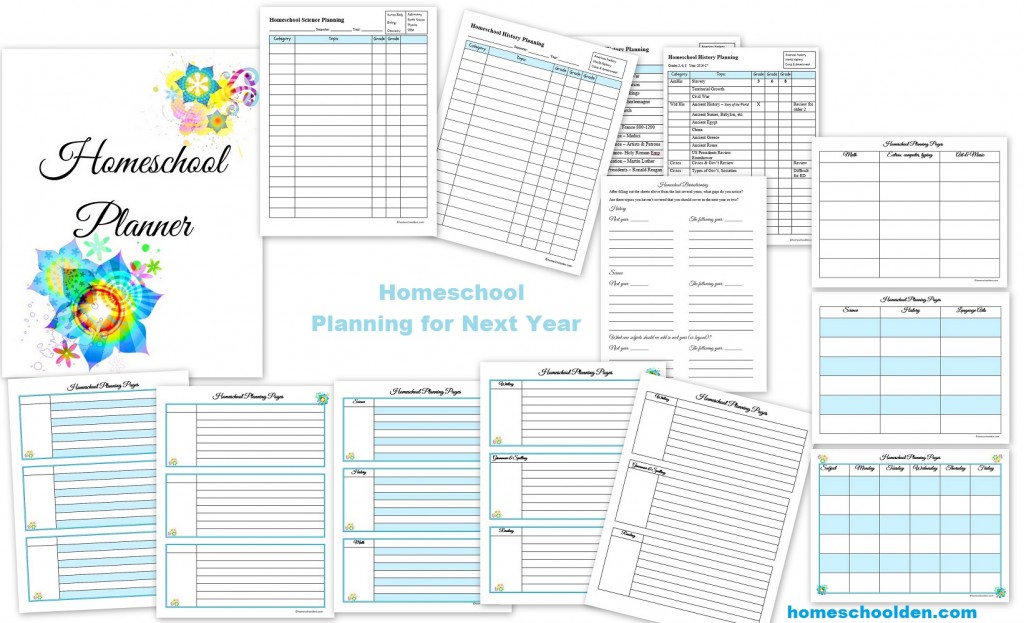
Be sure to subscribe here to receive our Homeschool Den Newsletter:
Before planning for next year, you might think about how things went this year!
Was your homeschool year a success?
In my mind, a successful year goes far beyond tests results, awards won, or pages covered. Homeschool Success comes in unconventional ways… The days we spent hours snuggled together reading and crying together over a book. The days we tried an experiment… and failed! The times we laughed hysterically while doing our work. Or when we stopped our “work” and focused on being kinder to one another. When we learned in non-traditional ways — on trips with friends, in co-ops, at the beach, in the kitchen, and from those long (sometimes week-long!) tangents! On the days the kids dove into their own projects. During the times we “just googled it” because we were interested in finding out more. A “successful year” comes from knowing we worked hard, laughed hard, delved deeply into new areas and came out the other side enriched by what we learned.
20 Questions to Consider
- Did the kids learn new things?
- Did the kids (and did we parents!) make some good friends this year?
- Did the kids grow in expected and unexpected ways?
There are more questions in the FREE Homeschool Planning Packet! 🙂
Step 1: What do the kids know? What subjects/topics have they covered?
One of the first steps I take when I’m planning for next year is to get a handle on what we’ve covered over the past few years.
Since I have three kids (and we tend to do our units together), I need to know what grades the kids were in when we covered a specific unit. The printable has room for 3 grades or another with just 2 grades.
I jot down the topics we covered, what category it falls under, and the grade of each of my kids… and any notes I might need for later. Maybe one unit was too hard for my youngest or was a review for my oldest, but not in much depth.
These are in the free Homeschool Planning Guide pdf
Step 2: What do the kids want to study? What inspires them?
What are the kids interested in learning?
Do the kids have a topic that they would love to dive into?
You might have your kids fill out this free printable End of Year Questionnaire. That could give you some insights into what really resonated with them this year. Here are a few sample questions:
- What was your best homeschool memory this year?
- What was your favorite project or activity?
- What was your favorite unit?
- What was the funniest moment from this year?
- What was your lowest homeschool moment? Did it get better?
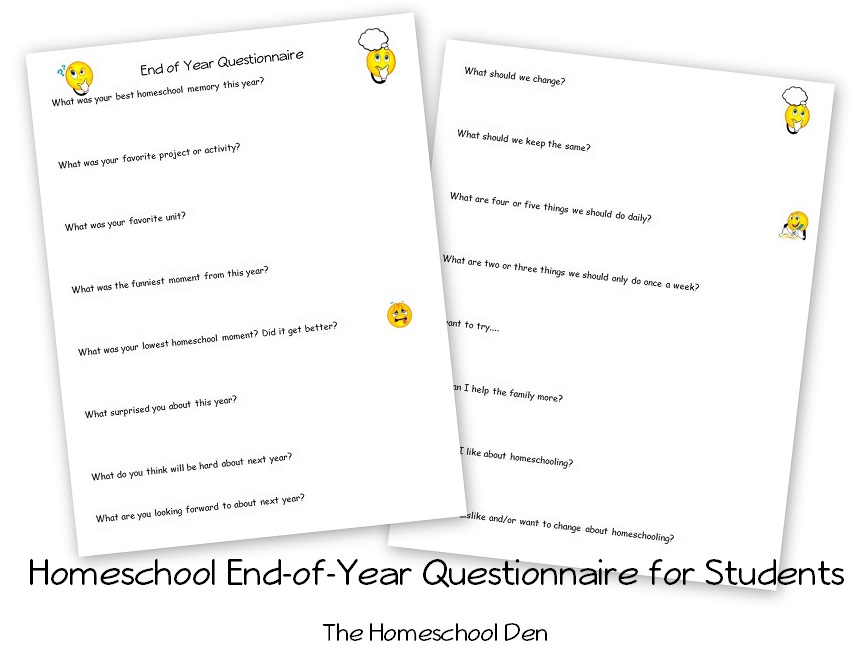
Step 3: What topics do we still need to cover?
One of the most common questions I’m asked is, how do I know what to cover? The question might be phrased, what should I be teaching my 4th grader? The wonderful (and scary!) thing about homeschooling is that there is no set curriculum. There are no guidelines that say you have to teach a certain topic or subject at a certain age. That gives us broad flexibility as homeschoolers to create a homeschool program that suits our kids and their needs! We can go in depth when there is interest. And better yet, we can go back and touch on things they learned before to help them review and go into more depth!
Be sure to check out some of the free resource checklists and guides I’ve shared (I’ll link to those free grade-by-grade guides below). The free science checklist includes the various science units/topics we (hope) to cover ages 5-14 or so. And, some homeschoolers have also found the free grade-by-grade resource guides I made helpful. (I know I need to update those at some point soon, since my youngest is still on this homeschool journey!!)
What we’ve wound up doing is revisiting topics again and again over the years, going over the material in more (and more!) depth.
For example, we’ve covered Earth Science as a full unit 3 times (once when the kids were in PreK/early elementary, once when they were about 7, 9 and 11 and once again when they were 9, 11 and 14. I suspect we will cover this material again when my youngest is around 13 or 14, just to make sure she remembers all the material. Each time we’ve added to and expanded on what they already knew. (Find out more about our 100+ page Earth Science Packet here.)
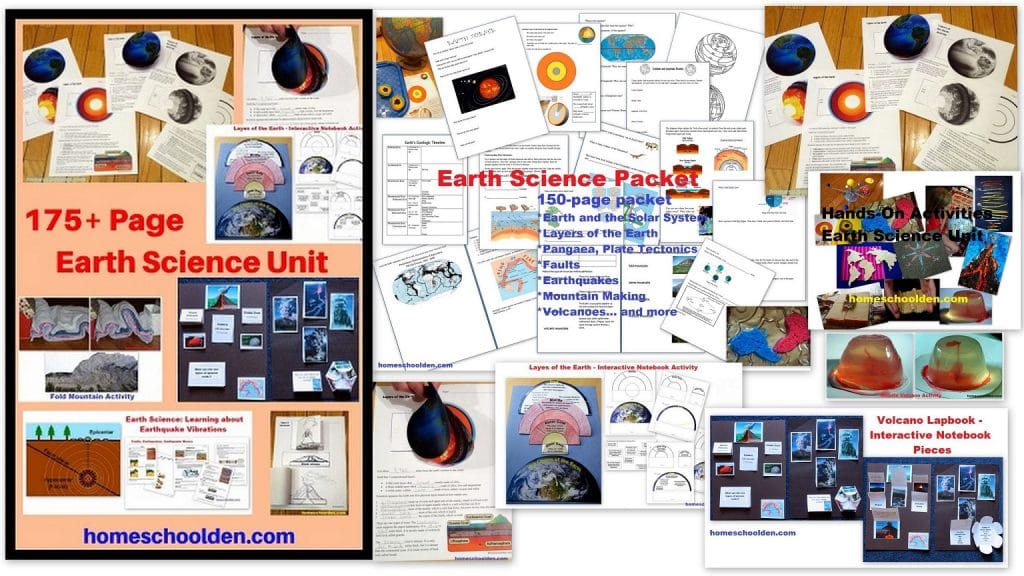
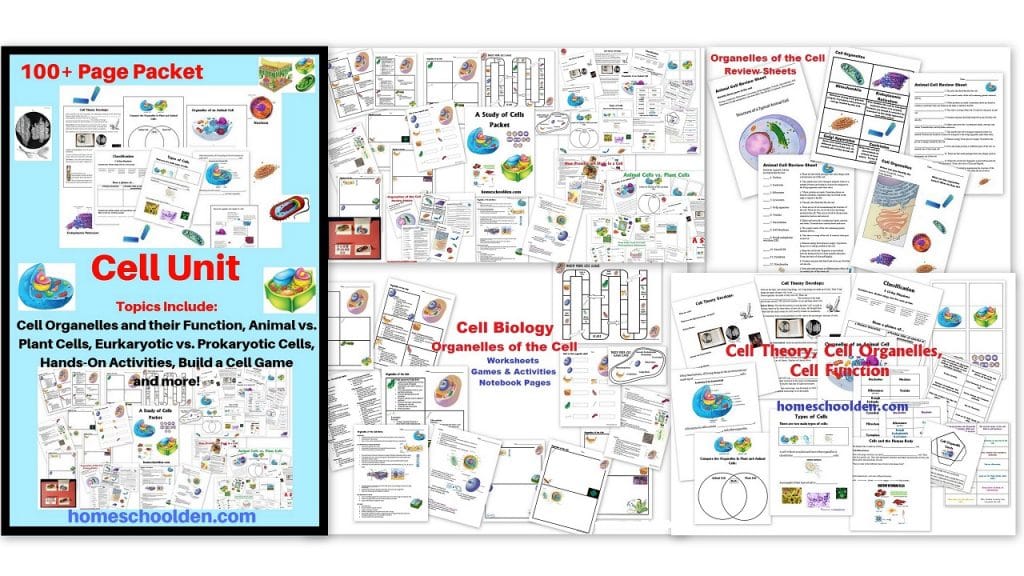
We also review some social studies topics numerous times:
- US States and Capitals Packet – Anytime we’ve covered American history, we’ve focused on the geography of the region too!
- Civics & Government – We’ve had to review this most every year. When I check in with the kids, they’ll say that they could use a refresher on some of those tricky facts… the three branches of government (the responsibilities, who can serve, how long they can serve, the Bill of Rights, basic civics review questions such as “What is the supreme law of the land?”
- World Facts, Geographic Features, Landforms, World Landmarks, Deserts of the World — This is information that people just seem to know… things like the largest countries, the longest river, the city or country with the most people… plus, basic geographic information such as landform words (archipelago!) or how to read a topographic map. We often touch on this at the beginning of the semester (or after a break).
Add-Ins: There are some general subjects that I keep in the back of my mind that we tend to touch on from time to time, but don’t come under a broader category like science.
- Music & Music History
- Art & Art History
- Typing & Computer Skills
- Computer Coding – Computer Science – For us, this is something that my husband now covers with the kids. They are also use a program we purchased. This year we are using codakid.
- Engineering Activities – Critical Thinking Skills
Foreign Language: Also, I decided to start the kids on a foreign language in elementary school. We could make language learning playful and fun… and by the time my kids were in middle school they all decided to take on a second foreign language. So, my kids are level 3 German speakers (and we continue to work on reading, grammar and speaking). My son is learning Japanese and my two daughters are learning Spanish with Sra Morato of HomeschoolSpanish Curriculum.com (that’s a long story, but they just love Sra. Morato and I love the emphasis on learning to speak!!)
Anyway, that’s definitely something to think about. It really helps kids in the long run if you start them on a foreign language early!
Here’s a free printable checklist of topics to start with (no matter what foreign language your kids learn): Topics for Beginning Language Learners.
I have a ton of German and Spanish freebies on the blog if you hunt around on the blog (not to mention the tons of other freebies tucked away there!!!
Step 4: What is our Homeschool Style or Philosophy?
There are so many different styles of homeschooling and each family will pick and choose the elements that suits their homeschool style. If your homeschooling is anything like ours it evolves continually as you find what suits each child.
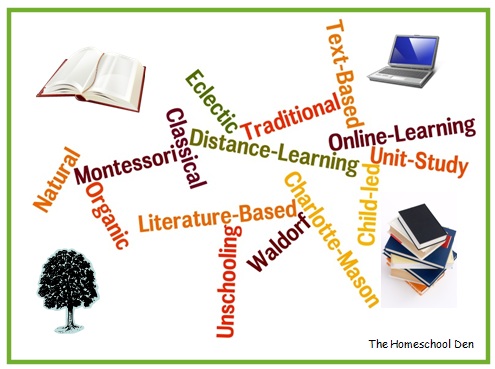
- Classical education
- Charlotte Mason
- Montessori
- Unschooling – Student led learning
- Unit Studies
- Virtual Homeschooling
- Waldorf
- Living Books — This includes curriculums like Sonlight that emphasize reading great books.
- Eclectic- a bit of this and that! Using a smattering of all the styles!
I’m not going to go into an explanation of all of these, but you may find that your family will move from one method to another as the kids grow and their needs change.
The Next Steps…
Planning, Purchasing & Adding in Hands-On Activities
Once you know WHAT you want to cover, it’s time to start breaking it down into sections. What sub-topics will you cover?
What hands-on activities will bring the subject alive?
You might want to visit these two posts for more ideas:
Hands-On Activity Ideas and Homeschool Teaching Strategies (Free Printable!)
This post has a wide range of different hands-on activity ideas and teaching strategies that might inspire you in your homeschooling! There are times when our homeschooling can start to feel a bit stale. That’s when we have to shake things up and try approaching things from a different angle. We all have homeschool teaching strategies that we rely on, but it’s really great to change those up from time to time. This is a free printable with lots of different types of hands-on teaching strategies. Hope it’s helpful! ~Liesl
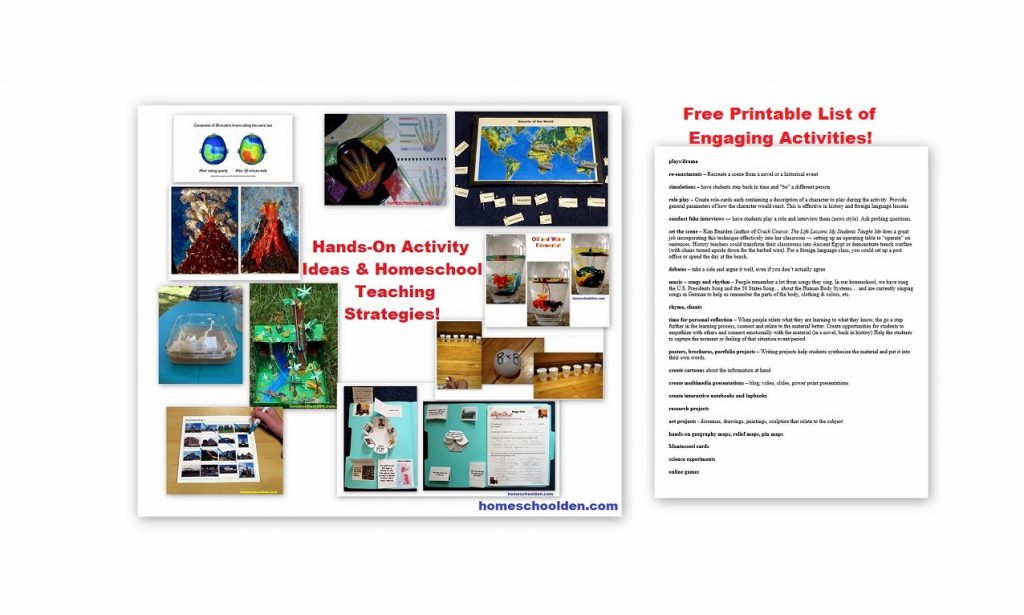
How will the kids learn the information?
- Reading
- Taking notes – Can the kids take their own notes? Will they use fill-in-the-blank notes? Will they do interactive notebook pages? Do their own research and writing?
- Oral presentations & Narrations
- Watching video lectures, movies, documentaries?
- Go to in-person classes?
- Take online classes?
Start gathering books (if purchasing) or creating book lists and double check to see that they are available at the library.
Organization – General organization is something I do much closer to the beginning of the new semester (re-organizing our homeschool materials, creating daily checklists for the kids, planning meals etc.). Here’s a post about Organization: Keeping on Top of Things While Homeschooling.
- Free Science Unit Checklist for Elementary & Middle School – These are the science units and topics I hope to cover by the time the kids finish 8th grade or so (age 14).
Visit the Science Checklist post or just add it to your cart. This pdf is free as well!
$0.00
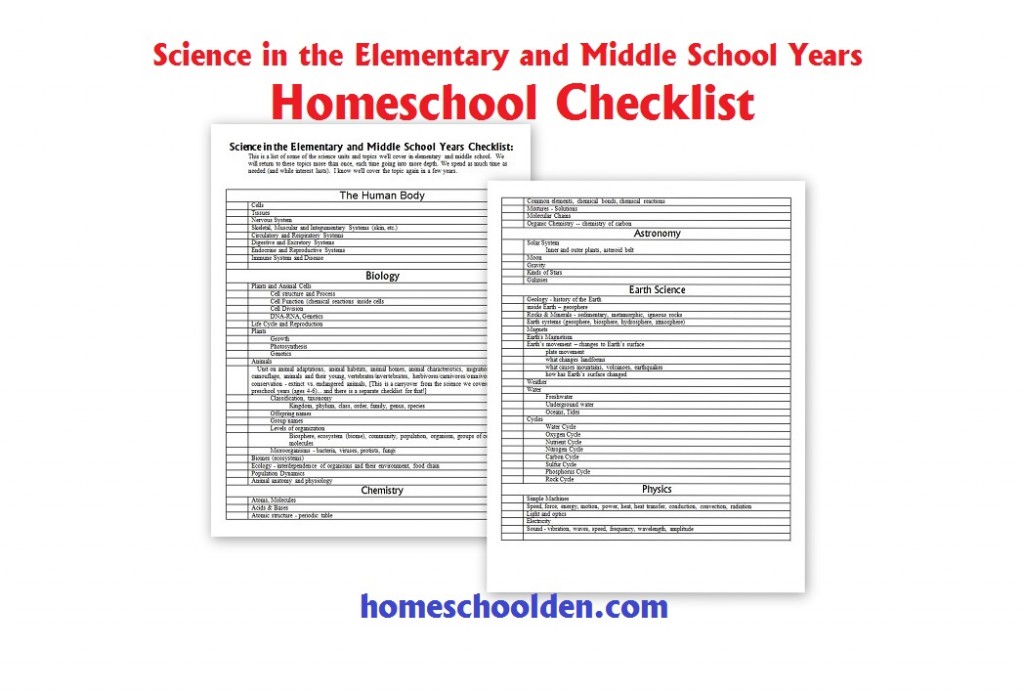
NEW! Homeschool Den Catalog: This (free) pdf has a list of many of the packets we have available. It gives you a quick glimpse of each of the units. In Our Store, you can click on the Quick Previews next to each product below to see many pictures/photos of what is included in each packet. Click here to view and/or download the FREE Homeschool Den Catalog.
Where do I start? What subjects should I cover? How do I know what to teach? … If any of those questions sound familiar or if you are looking for some new teaching ideas, you might check out these FREE homeschool planning guides:
Creating Your Own Homeschool Curriculum: These are some resources I made that might be helpful as you create your own homeschool plans. These are somewhere between 30 and 50 pages and are FREE to download:
And, if you are looking for some printables to create your own Homeschool Planner, you might want to check out our free Homeschool Planner. This unique homeschool planning packet is currently FREE to download! It is nearly 100 pages! Not only does this packet include daily and weekly planning pages, checklists and record keeping pages, but it also includes various homeschool journaling pages… think gratitude journal meets homeschool goal setting! Again, you’ll find it at this post: Free Homeschool Planner and Discovery Journal. I tend to change up my homeschool planning pages regularly as our needs change, so this packet of materials has steadily grown in size! There might be something you can use there! ?
Be sure to check out our FREE 100+ page Homeschool Planner for planning your daily and weekly homeschool schedule! It includes student checklists and more!
FREE Printable 2020-2021 School Year Calendar
I have been making our own calendar for years. I include various holidays, day light saving time and things like that. I print out calendar pages to include in my homeschool planner. (Printing both full pages and 4 to a page.) It goes through August of 2020. You will find our latest free printable calendar here:
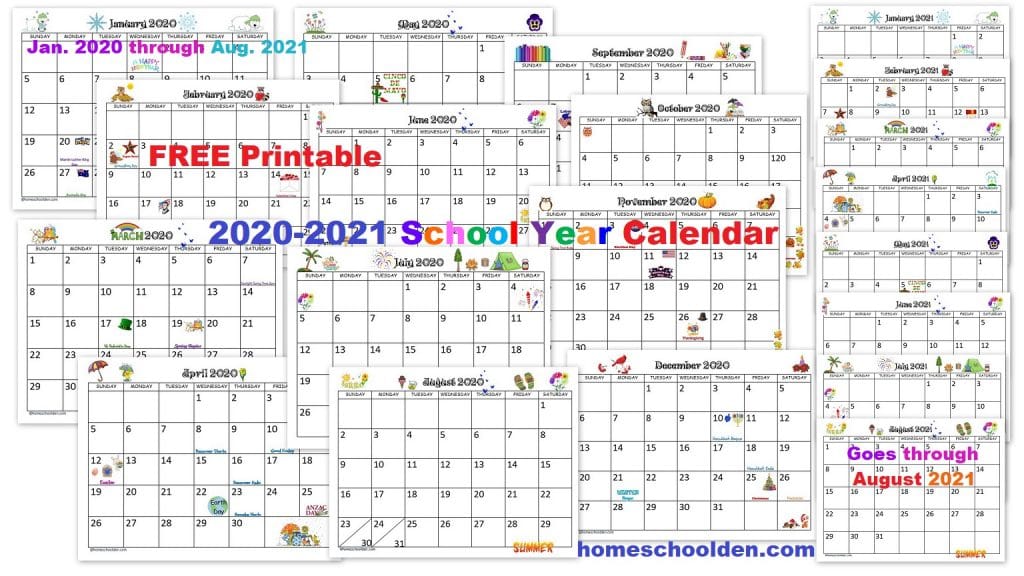


~Liesl
